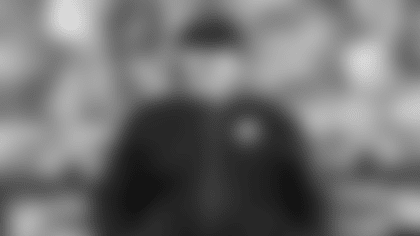Q. What kind of a team do you think you brought to Cleveland for this game today?
A. I brought an undefeated one, and hopefully we leave the same way. I'm always optimistic about our group, but at the same time I understand that we're going to be defined by how we perform over the course of this journey, so I make a conscious effort not to have too many preconceived notions. I feel like we have a good level of preparedness, but we have to go into the stadium and do it. I look forward to watching them take that significant step
Q. What kind of football wins games early in a regular season?
A. Fundamental ball. Over the course of the year, as the year wears on, I always say, "Detail gets you out of the stadium." That's because the more video you have out there, the fewer surprises and schematic advantages there are. At this time of the year, there's an element of the unknown, and so you have to be fundamentally sound. Your rules have to carry you, your fundamentals and techniques have to carry you. It's less about detail and more about not being negligent this time of the year. Not making mistakes, being where you're supposed to be and seeing what you're supposed to see in all three phases of the game.
Q. So at the end of today's game, what statistical categories would reflect that?
A. The turnover game is going to tell the story, particularly at the early portions of the year. You have to take care of the ball. Defenses can't warm up to taking the ball away. In recent years we've done that, we've been a hot team over the second half of the season in terms of producing turnovers. I'll be interested to see how we come out of the gate this year. It's important that we don't warm up in that area of the game, because taking the ball away gives us a chance to be what we need to be.
Q. Joe Haden played for the Browns. Sammie Coates played for the Steelers. Today Haden is in a Steelers uniform and Coates is in a Browns uniform. Does anything have to change from an audible or signal-from-the-sideline standpoint because of that?
A. There's a lot of familiarity between the two teams anyway. We've got coaches who have coached over there. There is close physical proximity between the teams and the cities. We play each other twice annually. The coaching history – Hue Jackson is relatively new to Cleveland, but he's not new to this division or us. He's been in Baltimore, he's been in Cincinnati. There are very few secrets in the AFC North, so a couple of men moving back and forth from team to team, that's minimal. We had Justin Gilbert on our team a year ago, and he was a former member of the Cleveland Browns. So the quality of the play is going to determine the outcome, as it should.
Q. Generally speaking, though, if you remove it from within the division, when a player is signed or acquired from another team, is the guy generally de-briefed about his old team – signals, tendencies, strengths and weaknesses of his old teammates?
A. Certainly. That's human nature, especially when it's an unfamiliar opponent. But to be quite honest with you, there's nothing that Joe Haden can tell us about Cleveland that we don't already know, and I'm sure they feel the same way about the information Sammie Coates could bring to them. That's just the nature of this business when it comes to divisional football and the nature of these rivalries.
Q. How have the new guys – Joe Haden, J.J. Wilcox, Vance McDonald – assimilated themselves into your systems? Are you comfortable they can handle the full regular season menu for their respective positions?
A. I think they've done an awesome job. All three guys are in a similar circumstance in that they have to learn a lot of football in a very short period of time. The fact they're all veterans helps with that. The rest of the things we're just getting to know along the way – the inter-personal things, the common things that bind you, the relationship things. We're getting to know each other on the fly, but all the guys have done a nice job of acclimating themselves to the football and preparing for the challenge of work this week.
Q. Are there certain positions on a team where it's easier to jump right in and play?
A. When you're talking about veteran football players, I really think all of them probably have an equal opportunity to get up to speed. Knowing enough to be able to compete is one thing. Knowing the intimate details in order to be great is another thing. Those guys know enough to compete and be functional this week, but their maturation process, their assimilation process will be ongoing. That's just the nature of it.
Q. During the preseason, you said this was going to be a team in development even into the early part of the regular season, and that the big thing is to win along the way. How does an NFL team find ways to win games?
A. Quite simply and not to be funny, but to score one more point than the opponent, or hold that opponent to one fewer point than we score. A lot of football in a lot of stadiums at this time of the year is far from perfect, but relative to the nameless gray faces on the other sideline is really what defines performance this time of the year. We just have to be better than the Cleveland Browns today.
Q. What's your plan for Le'Veon Bell today?
A. We're going to play it by ear, much as we've done it all week. We know that Le'Veon is a highly conditioned athlete. We know that he's a sharp guy and that he's a quick study. We went into the week with all of that information at our disposal. We simply worked him over the course of the week and then we evaluated that work at the end of the day. And by evaluation, I mean the quality of the work and then we also evaluated the quality of his football conditioning. Those are two things that we did at the end of each day. The next day before we started the work, we just did a general assessment of how he felt based on that work, and then we repeated the process. We did that a couple of times and got a general assessment of what he's capable of. We understand that in-stadium work is a little different, and so we'll be continually communicating with him, and watching, and playing it by ear.
Q. How will his playing time be handled in terms of you possibly imposing mandatory rests, or will he be allowed to have input into that procedure?
A. There's more to manage now. There's very little to manage once you get down into November. It just becomes less of a deal, because you have a totality of the work you've done in 2017 as a frame of reference. The reason you're micromanaging now is you don't have a lot of information about where he is in a lot of football elements. It's going to stress us a little bit, but such is life.
Q. What kind of defense can you expect from a unit coordinated by Gregg Williams?
A. Gregg has a definitive personality. More times than not he is the aggressor. But he's been in this business long enough that I think a lot of his matchups and approaches depend on the matchups. His ability to cover. Your ability to block. And finding that sweet spot. I know that about him because I competed against him over the years and have a lot of respect for him. It'll be a knock-down, drag-out as it always is. He'll do things to challenge you schematically, and equally as important is that his guys always come in with the frame of mind that they're ready to play.
Q. The Browns have announced they will start rookie DeShone Kizer at quarterback. In what ways do NFL teams try to protect a starting quarterback who's a rookie?
A. I don't know that it's a global thing. I think play-callers have certain personalities. Hue Jackson, for instance, has a certain personality, and we've had an opportunity to compete against him over the last several years with somewhat young and inexperienced quarterbacks. We played him last year when he had Cody Kessler starting. We played him the year before when he was the coordinator in Cincinnati and he had A.J. McCarron. It's not a complete unknown for us. I assume he has the same mode of operation or a similar mode of operation when he's going into a stadium with an inexperienced guy. Thankfully in the past 12-to-24 months we've been in those situations and circumstances with him a few times.
Q. During the pre-draft process last year when you were scouting Jabrill Peppers, currently listed by the Browns as a starting safety, what was your opinion of the kind of player he was?
A. I thought he was an awesome, dynamic football player. Michigan used him in some ways that really were unique and highlighted his skills and abilities. He played linebacker in sub-packages situations. He returned kicks. He played running back. He played Wildcat quarterback, and that really speaks to the talents of this young man. I was highly impressed by him, and I'm sure the Browns are glad he's on their team.
Q. What have you seen on video in terms of how the Browns are utilizing Peppers?
A. It's minimal (what's on video), just base things in terms of preseason football. I'm not seeking comfort based on what I've seen on preseason tape. Things change when it goes from preseason to regular season. I've seen things that I anticipated. He has played safety. He has returned kicks. But I won't be surprised to watch his role expand in a lot of ways once the regular season begins.
Q. The team captains were announced earlier in the week, but there was no special teams captain this year. Why is that?
A. I just made the decision to challenge the group and open up the opportunity for anybody who's performing to represent us at the coin toss. The guy who gets designated as a significant contributor week in and week out will be the guy who represents us at the coin toss. I just thought that was appropriate. I think we have a lot of capable, veteran guys who play special teams for us. Guys like Rob Golden and Vince Williams, and now Anthony Chickillo and Tyler Matakevich and others. Darrius Heyward-Bey. I just think there were so many worthy candidates and in an effort to be fair to everyone, I'll let performance dictate who represents us.
Q. The Steelers offensive line is one of the strengths of the team. Is a good offensive line especially valuable on the road?
A. I think it can carry you regardless of circumstance. Being strong in the interior line play, particularly in the offensive line, is one of those tools you can pull out of the toolbox regardless of circumstance. It aids you early in the season. It aids you in hostile environments. It aids you when you have skill guys out. You name it. A strong offensive line is a good thing.














